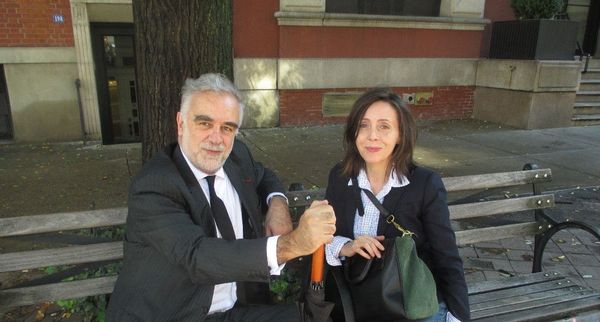 |
| Luis Moreno Ocampo told Anne-Katrin Titze that Watchers Of The Sky director Edet Belzberg and US Ambassador to the United Nations Samantha Power are the "new Raphael Lemkins." Photo: Susan Norget |
Luis Moreno Ocampo was appointed the first Chief Prosecutor of the International Criminal Court at the Hague in 2003. During his nine-year term he was responsible for "investigating and prosecuting massive atrocities" and gathering evidence to build a consensus with the member States in order to "enforce the rules".
In New York, a relaxed Luis Moreno Ocampo told me about the day Raphael Lemkin came into his life, the insight Nuremberg prosecutor Benjamin Ferencz gave him, the need for a protocol in the global system, why Star Wars is incredibly smart and how much he enjoys Woody Allen, Visconti and the Coen brothers.
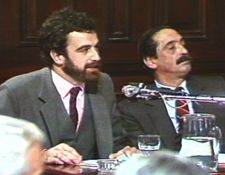 |
| Luis Moreno Ocampo prosecuting at the Argentine 1987 Junta trials: "I had 1600 suspects. I cannot do a case against 1600." |
In Edet Belzberg's Watchers Of The Sky, which won the Sundance Film Festival US Documentary Editing Award and a Special Jury Award for Use of Animation we see him at work. Her film is inspired by Samantha Power's Pulitzer-winning book A Problem From Hell: America And The Age Of Genocide.
Anne-Katrin Titze: When did you first see Watchers Of The Sky?
Luis Moreno Ocampo: I was teaching at Yale and I presented the movie at Yale in January.
AKT: A lot happened since then, especially in Darfur.
LMO: What happened in Darfur?
AKT: I was at an event for The Good Lie earlier this month and Samantha Power said that the last nine months in Darfur have been the worst since 2004.
LMO: Ah, you mean not good. Nothing good. For me, what is great is the work that Samantha's doing with the book and Edet doing the movie about the book in keeping the issue updated - it's a great continuation. We can understand about 21st century problems and have a new idea to deal with them. This way the movie brings hope. The solution is there. We have the law now. We have the court [ICC]. We need to build the rest.
AKT: What is the rest?
LMO: The rest is political commitment and ability to enforce the rules. That's it.
AKT: The film makes the point that the ICC has no police force.
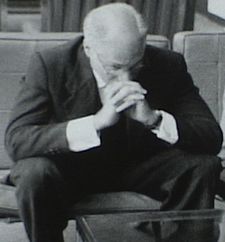 |
| On Raphael Lemkin: "He self-imposed this crazy mission to adopt the Genocide Convention and he did it." |
LMO: But no court in the world has police. In the US, the judges, they have no police. But when they say, go and arrest someone, the police goes and arrests someone. The protocol is very clear in the national system. We need to build the same protocol in the global system and that is the challenge. That's why the movie with all the information together is a great continuation to the discussion. Today, we are dealing with ISIS. You know what? We have a solution for ISIS. We need a commitment from all the States.
The International Criminal Court has 122 States. You have 122 partners and in the Libya case with Gaddafi the world was able to play together. There was consensus. China, Russia, US and India agreed to send the Libya case to ICC. Now it's complicated because the parting with Russia is affecting the community to work together. We need to go back. I think that is crucial.
AKT: To go back meaning?
LMO: To get Russia on board again is of crucial importance.
AKT: Where are you located now with your work after your nine years at the ICC?
LMO: For nine years I was helping to investigate and prosecute massive atrocities at the ICC. Now I'm a global practice counselor at a law firm in New York. Global efforts to help individuals and companies to improve integrity and control fraud in the global market. Now I'm trying to use my skills on corruption issues and helping to improve the global market. There is a lot of inequality in the world today.
The 85 wealthiest people in the world have a similar amount of money as 3.5 billion of the poorest people in the world. That inequality in some way is a product of corruption. I did my effort on massive atrocities, now I'd like to help to improve how the global markets are working. I'm also teaching at Harvard and Yale and I'm writing a book about the ICC. And I help my wife to raise our kids properly.
AKT: That's a busy life you are leading.
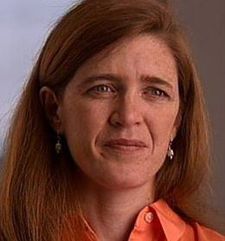 |
| Samantha Power, author of A Problem From Hell: America And The Age Of Genocide |
LMO: You know what? I'm totally relaxed. I decompressed. My nine years at ICC were insane [He completed his term in 2012]. You feel the crazy pressure and then you have to do your job properly. Ignoring the pressure.
AKT: The documentary gives us a glimpse into your work. Still it becomes obvious how every move counted.
LMO: It was fascinating because I had to protect the security of the witnesses, my investigators. I had to collect the evidence. I had to do legal work. I had to discuss how to present. I had to discuss with the States who were changing their minds all the time. And everyone requested something different from you.
AKT: You were also inventing the job. Nobody came before you. The ICC was established about 50 years after Raphael Lemkin had the idea [and coined the word Genocide]. When did you first come across Lemkin?
LMO: In fact, I met Samantha [Power] in 2002 when she was finishing her book [A Problem From Hell: America And The Age Of Genocide]. i remember discussing with Samantha Rwanda, the book, the picture she was going to put on the cover page, that was for me the day Lemkin appeared in my life. Through Samantha. And it's funny, after I met Edet Belzberg in 2005 when I was the Chief [ICC] Prosecutor and she started talking about the movie on Samantha's book, she was interviewing me, I don't know, 20 times over nine years. In some way, these two ladies introduced me to Lemkin.
AKT: Lemkin remains somewhat of a mystery. We get a much clearer sense of you, Benjamin Ferencz [Nuremberg prosecutor] and Emmanuel Uwurukundo [UN refugee officer]. Near the end of the film, I believe you say, that he died ignored with a feeling of frustration. You have done so much good, does the frustration ever get to you?
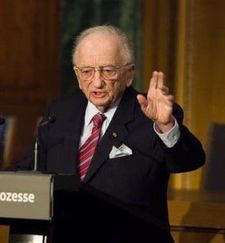 |
| On Nuremberg prosecutor Benjamin Ferencz: "Mr. Ferencz, can you explain to me how did you do it in Nuremberg?" |
LMO: You must understand. For me, investigating at the ICC those crimes was my job. I was hired to do that. I was paid. I had a lot of people working for me. Lemkin invented himself. He self-imposed this crazy mission to adopt the Genocide Convention and he did it. For me, Lemkin is incredible. When people say, what can I do? That's why the movie is so great, [it shows that] even an individual, isolated as Lemkin can do so much. You can do something better. Samantha spent years writing the book, and Edet had to put together all those images - both of them are the new Lemkins.
AKT: What is the hope with this film for you?
LMO: First, for me the film brings hope. We have ISIS now committing genocide in Syria and Iraq. We need to just keep building. The movie is showing that it's a slow process, because Darfur is still ongoing genocide. We should learn - leaders follow people now. If people see the movie and we manage to include the movie in schools to educate, then leaders will follow the people. Samantha and Edet both created the platform for Lemkin, still, in a democracy, even today. And we need him today.
AKT: He died in 1959 and he hasn't finished his life, yet.
LMO: His idea is still a radical idea! Even with ICC existing and everything evolving, we have the convention but Lemkin's idea is still radical. To use the legal system providing order at the national setting, to use the same on the global level, that is still a radical idea.
AKT: Something you say in the film can be relevant on many levels. " Some people hate you. Some people support you. And you have to ignore both."
LMO: That was my job. I had to impose the law, extend the law in a wide global scenario and I knew everyone would fight with you. I knew you had to just keep the law. I could not do things because someone was asking me to go beyond the law. You had to keep your focus. That's why it was so interesting. For me it was incredibly important to build an institution.
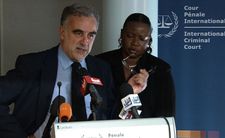 |
| Chief Prosecutor Luis Moreno Ocampo at an International Criminal Court press conference: "My job was to put reality below the dreams and against hypocrisy." |
AKT: At one point you say "the trials show respect for the victims because we are transforming the stories into evidence." What does it mean to transform stories into evidence?
LMO: We interviewed a 55 year-old man in a refuge camp in Chad. He said, "I was waiting for you. My village was surrendered. They burned my house. They raped my wife. They raped my girls. They forced me to watch when they were raping my eight-year-old daughter." He gave all the details and at the end he said, "now, I can die. I did what I should do." That's what we do.
We go to see the victims and they transform their awful experience into something that they feel is useful. And then we use their testimony to provide evidence against Omar al-Bashir. That's why it is incredibly liberating for them.
AKT: Because their storytelling has consequence.
LMO: We transform him from a victim into someone who is a man of justice. We provide leverage to him and he feels that he is not alone.
AKT: How did you protect yourself from the stories you must have heard?
LMO: That's why I do what I do with you. That's my way to protect myself. Keep helping! Edet has 800 hours of footage. There were six documentaries about me, normally 150 hours. I am trying to convince her to use it for education and transform this into material for schools. Transform it into a new way to teach and connect it with ISIS, with the current crisis.
AKT: Many people close their eyes and don't want to know what is going on in the world.
LMO: Because it's very frustrating. If you know a lot and have empathy for the people in Darfur and you know, nothing changed, you get so frustrated. That's why Lemkin was amazing because he kept fighting, pushing. Committed people need to keep doing. Samantha, Edet, and many others. You are now reporting, that's the point. We are committed people. We know we'll never finish, but we know we'll never stop.
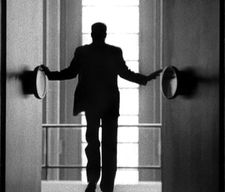 |
| Luis Moreno Ocampo at the International Criminal Court: "For me it was incredibly important to build an institution." |
AKT: Let me add a third quote from you in the film. "Silence has never protected victims, silence only helps the criminals."
LMO: That is Elie Wiesel. I don't mention him, but it's his quote. For the Ambassadors it was impossible to understand what I was saying. They have a completely different mind set. The goal is to reach agreement and not to fight. So for them I was a nightmare.
AKT: What specifically made you a nightmare for the Ambassadors?
LMO: For instance, one Ambassador was telling me " Luis, please this time be more professional!"
AKT: Professional meaning...?
LMO: Exactly! I said "what do you mean?" He said " You are too emotional. When you talk about these girls being raped. This is not for us. This is too emotional." Because he was a nice guy, he was affected by that. He didn't like that. He had to keep cold to keep making deals with criminals and ignoring.
And my way to present the case to them for him was very emotional and was not professional. Because professional is cold. For me, I was not emotional, I was just presenting the facts. At the diplomatic level, when they talk about the principles, they don't talk about the facts. And when they talk about the facts, they don't talk about the principles.
AKT: Despite the great responsibility you had, your position also, it seems, gave you a freedom, the people in these official positions did not have.
LMO: I was the first global public servant independent. My obsession was how to be more efficient.
AKT: On a lighter note, what kind of movies do you like? If you ever get the chance to watch movies.
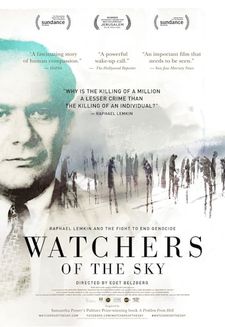 |
| Watchers Of The Sky poster |
LMO: I like the old movies of Woody Allen. Hannah And Her Sisters and Manhattan and Annie Hall. Japanese movies like Ran, Visconti movies...
AKT: These are all beautiful choices. Anything more recent?
LMO (laughing and thinking): The Coen brothers are great. Star Wars is incredibly smart and so modern because it has a planet surrounded by an army which is representing the Chamber of Commerce. The Chamber of Commerce has so much power that it's attacking a planet. My work on anti-corruption is also about protecting individuals against powerful people.
AKT: The ICC can only deal with crimes committed after 2002.
LMO: The Nuremberg crimes plus genocide and the way to do it was for the future and not the past. It was complicated. A very strong discussion. This ICC creation was an agreement between dreamers and hypocrites. And my job was to put reality below the dreams and against hypocrisy. And that's why everyone was feuding with me.
AKT: The decision making on which criminals to prosecute must have been a tough one. Just in terms of numbers.
LMO: Some of it is in the movie. In 1987, I was an Argentinian prosecutor prosecuting army officers who were involved in the Dirty War. I had 1600 suspects. I cannot do a case against 1600. In principle, all of them could be responsible. So I had no legal way to discriminate who is in, who is out.
I came to New York to a meeting and I was on a panel with Ben Ferencz years ago. And I said, "Mr.Ferencz, can you explain to me how did you do it in Nuremberg?" He said: "We had evidence against thousands of people and we chose 22." And I thought, ah, here is the principle, the idea. Why 22? And he said "we had 22 chairs."
So, one of the first things I did when I took office was, I said, I will just prosecute those who have the greatest responsibility. I offer a very limited number of cases but very high level because that will increase the preventative impact. It's more complicated but it's more useful.
AKT: Thank you very much, not only for this interview, but for the important work you do.
Watchers Of The Sky is currently in theatres in New York and Los Angeles.





















